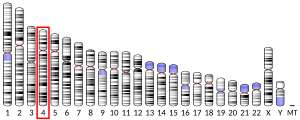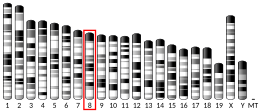Hedgehog interacting protein (HHIP) is a protein that in humans is encoded by the HHIP gene.[5][6][7]
This gene encodes a protein similar to the mouse hedgehog interacting protein, a regulatory component of the Hedgehog signaling pathway. Members of the hedgehog family are evolutionarily conserved proteins which are involved in many fundamental processes in embryonic development, including anteroposterior patterns of limbs and regulation of left-right asymmetry.[7]
References
edit- ^ a b c GRCh38: Ensembl release 89: ENSG00000164161 – Ensembl, May 2017
- ^ a b c GRCm38: Ensembl release 89: ENSMUSG00000064325 – Ensembl, May 2017
- ^ "Human PubMed Reference:". National Center for Biotechnology Information, U.S. National Library of Medicine.
- ^ "Mouse PubMed Reference:". National Center for Biotechnology Information, U.S. National Library of Medicine.
- ^ Bak M, Hansen C, Friis Henriksen K, Tommerup N (Jul 2001). "The human hedgehog-interacting protein gene: structure and chromosome mapping to 4q31.21→q31.3". Cytogenet Cell Genet. 92 (3–4): 300–3. doi:10.1159/000056918. PMID 11435703. S2CID 32938414.
- ^ Ingham PW, McMahon AP (Dec 2001). "Hedgehog signaling in animal development: paradigms and principles". Genes Dev. 15 (23): 3059–87. doi:10.1101/gad.938601. PMID 11731473.
- ^ a b "Entrez Gene: HHIP hedgehog interacting protein".
Further reading
edit- Chuang PT, McMahon AP (1999). "Vertebrate Hedgehog signalling modulated by induction of a Hedgehog-binding protein". Nature. 397 (6720): 617–21. Bibcode:1999Natur.397..617C. doi:10.1038/17611. PMID 10050855. S2CID 204991314.
- Strausberg RL, Feingold EA, Grouse LH, et al. (2003). "Generation and initial analysis of more than 15,000 full-length human and mouse cDNA sequences". Proc. Natl. Acad. Sci. U.S.A. 99 (26): 16899–903. Bibcode:2002PNAS...9916899M. doi:10.1073/pnas.242603899. PMC 139241. PMID 12477932.
- Clark HF, Gurney AL, Abaya E, et al. (2003). "The Secreted Protein Discovery Initiative (SPDI), a Large-Scale Effort to Identify Novel Human Secreted and Transmembrane Proteins: A Bioinformatics Assessment". Genome Res. 13 (10): 2265–70. doi:10.1101/gr.1293003. PMC 403697. PMID 12975309.
- Ota T, Suzuki Y, Nishikawa T, et al. (2004). "Complete sequencing and characterization of 21,243 full-length human cDNAs". Nat. Genet. 36 (1): 40–5. doi:10.1038/ng1285. PMID 14702039.
- Olsen CL, Hsu PP, Glienke J, et al. (2004). "Hedgehog-interacting protein is highly expressed in endothelial cells but down-regulated during angiogenesis and in several human tumors". BMC Cancer. 4: 43. doi:10.1186/1471-2407-4-43. PMC 512291. PMID 15294024.
- Gerhard DS, Wagner L, Feingold EA, et al. (2004). "The Status, Quality, and Expansion of the NIH Full-Length cDNA Project: The Mammalian Gene Collection (MGC)". Genome Res. 14 (10B): 2121–7. doi:10.1101/gr.2596504. PMC 528928. PMID 15489334.
- Kayed H, Kleeff J, Esposito I, et al. (2005). "Localization of the human hedgehog-interacting protein (Hip) in the normal and diseased pancreas". Mol. Carcinog. 42 (4): 183–92. doi:10.1002/mc.20088. PMID 15754313. S2CID 85407133.
- Martin ST, Sato N, Dhara S, et al. (2006). "Aberrant methylation of the Human Hedgehog interacting protein (HHIP) gene in pancreatic neoplasms". Cancer Biol. Ther. 4 (7): 728–33. doi:10.4161/cbt.4.7.1802. PMID 15970691.






